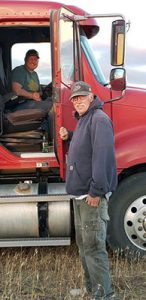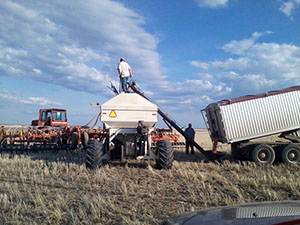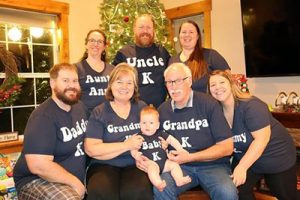Closer Look: Harvest of Hope
By Cheryl Tevis1
Reprinted with permission from the National AgrAbility Project.

Mike Koepke was 13 when he began helping his dad on the family farm near Cut Bank, Montana. “My older brother told me he wasn’t coming back after college, so I decided to make agriculture my life,” he says.
In 1982 he and his wife, Sheila, graduated from college, and started farming. Over the next 31 years, the Koepkes grew their business, raised a family of three, and looked forward to farming for as long as they enjoyed it.
One foggy October morning in 2013, this goal became more challenging. Mike had harvested the spring wheat and signed a contract to sell it. “I took Sheila to work, and headed home to start hauling,” he says.
Mike was driving their 2012 Ford Fusion when suddenly he saw headlights coming at him in his lane. A big belly dump semi-truck hauling gravel had pulled out to pass a 4-wheel-drive tractor. He braced for impact, as the semi hit him head-on.
“Pieces of the car were disintegrating, metal and plastic were twisting and breaking apart around me,” he says. “I cried out, ‘Oh, God. . . Oh, God!’ I asked for His help.”
Trapped in the vehicle, Mike dialed 911 three times, but the line was busy. The sheriff’s line was busy, too, but he reached Sheila. By the time a co-worker rushed her to the scene, the sheriff, fire trucks, and ambulance had arrived.
“Thank goodness, he was driving a vehicle with safety features, and wearing his seat belt,” Sheila says.
The fire department used the Jaws of Life to extricate Mike, and he was taken to Northern Rockies Medical Center in Cut Bank. X-rays didn’t indicate life-threatening injuries. “I was told, ‘If you can stand for five minutes, you can go home’,” he says.
But as Mike tried to swing his legs off the exam table, he felt his pelvis abruptly shift. A CT scan revealed it was shattered. He was taken by ambulance to Great Falls, where he had surgery to insert a plate and eight screws. The torn ligament in his left leg, and an injured right wrist would need to heal.
Mike was hospitalized for nine days. At home, he began the slow process of recovery. “I couldn’t make it up two steps into the house with a walker—I had to hop,” he says. Sheila adds, “Every day, he got up, put his clothes, shoes and socks on, and hopped to a living room chair. He never stayed in bed. Ever.”
Three months after the accident, the Koepkes’ son Drew was married. “We hid Mike’s crutches in the wedding pictures,” Sheila says.
“I had to learn to walk again,” Mike says. But physical therapy three days a week required a team effort. Sheila was working full-time, so their children: Tyson, a molecular plant scientist at Washington State University, Ashley, an associate registrar at the University of Providence in Great Falls, and Drew, an information technology specialist who lives in Missoula, adjusted their schedules so they could take him. And that’s not all.
“My kids taught me to drive again,” Mike says. Sheila adds, “They didn’t tell me—I was at work.”
He returned for surgery on his wrist in June, and a steel plate and nine screws were inserted.
Taking care of business
 In the meantime, the farm work couldn’t wait. The Koepkes farm about 2,000 owned and crop-shared acres 20 miles south of the Canadian border. The immediate need was to hire trucking to deliver their high protein spring wheat for export to Pacific Rim countries.
In the meantime, the farm work couldn’t wait. The Koepkes farm about 2,000 owned and crop-shared acres 20 miles south of the Canadian border. The immediate need was to hire trucking to deliver their high protein spring wheat for export to Pacific Rim countries.
Their malt barley goes to MALTEUROP in Great Falls. “We feed the world, and try to quench its thirst,” Mike says.
Adjustments also were required on the home front: the Koepkes’ century-old farmhouse. “There was one small bathroom, with a toilet, sink, and tub,” Sheila says. “Mike used a transfer bench and a hand-held shower head—but it didn’t work for what he needed.” In January 2014, their remodel featured an accessible toilet, walk-in shower, safety bars, and built-in bench. “It made a safe place for him to shower independently while I was at work,” she says. “Small changes can be big.”
Mike progressed from crutches to a cane. “I still was having balance issues,” he says. He also noticed difficulties with dexterity and calculations.
It was 2016 before they recognized the cause. “We lived in a place of shock and trauma for a long time,” Sheila says. “We just got used to the way things were.”
After tests revealed that Mike had suffered traumatic brain injury (TBI), he went to speech and memory therapy. “Mike never felt sorry for himself,” Sheila says. “We just kept trying to move forward.”
In the spring of 2014, the Koepkes hired a neighbor to plant. “My goal was to harvest it myself,” Mike says. “The kids came home weekends or took time off to help us do it.”
In February 2015, Mike’s torn ligament led to a total knee replacement. Again, he hired the planting and spraying.
In 2016, Sheila’s brother discovered the National AgrAbility Project (www.agrability.org). Bill Field, National AgrAbility director, Purdue University and Bill Begley from Life Essentials, a mobility equipment company, visited the Koepkes to share information about assistive farm equipment and adaptations.
“That was our best day in three years,” Sheila says. “We were struggling to get back to normal–we just didn’t know how.”
Thanks to AgrAbility, Mike began listening to music as therapy, and practicing repetitive phrase and word exercises. AgrAbility also offered tips for reorganizing his farm shop.
In 2019, the Koepkes traveled to Maine for their first National AgrAbility Training Workshop, where they found an encouraging sense of kinship, and useful workshops.

In 2020, Sheila retired after 20 years as a Farm Service Agency program technician. “I needed a job, so I was up at 6 a.m. the day after,” she says. Mike handled the spraying, with help from Drew, Tyson, and Sheila.
The Koepkes recently welcomed the birth of their first grandson. “Mike has come a long way,” Sheila says. “We’re still looking at adaptive equipment, as our budget allows. We didn’t realize there’s so much hope out there.”
She adds, “I don’t think I can convey how much better AgrAbility has made our lives. Bad things can happen to good people. We all go through challenges in life.”
1Cheryl Tevis was senior risk management editor with Successful Farming magazine for many years. She is currently a freelance writer and editor with AgPerspectives, Inc. and president of Iowa Women in Agriculture.
